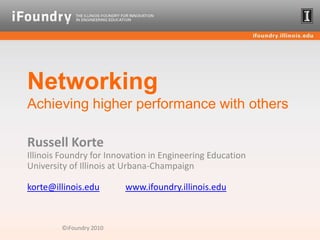
Networking korte
- 1. NetworkingAchieving higher performance with others Russell KorteIllinois Foundry for Innovation in Engineering EducationUniversity of Illinois at Urbana-Champaignkorte@illinois.eduwww.ifoundry.illinois.edu ©iFoundry 2010
- 2. Networking Examples of the need to build networks. Why networks are important. How to build high-quality networks.
- 3. Getting a mentor [I asked him], Who do I talk to? Then he’d kind of be like—OK, I think it’s this person. And then he’ll just look up the name for me real quick and he’ll let me know. [My coworkers are]approachable, but you kind of get the feeling like—don’t bother me. You can go ask them questions and stuff like that, but then their cell phone rings or something comes up. So you kind of, there’s this feeling of—ask questions, but don’t take too much of my time.
- 4. Obtaining membership I felt part of the group within two months. . . . Going to lunch with them, talking to them about nonwork stuff.The other new hires, like, we’ll go out to the movies during the weekends. A lot of interaction. Of the companies I’ve worked at, [this one] is really not very quick to accept new people in that there is the [company] lifer mentality, that if you didn’t come here at the beginning of college and [were not] raised in [the company] perspective and way of life, then why should we trust you?
- 5. Getting known People say it’s who you know. I said—“Well, it’s not really who you know. The question is—who knows you? First of all, being at [company], everybody wants to get to the eighth level. They want that, and of course they say the eighth level is one of the most difficult levels to get to, unless you know someone. The projects I get are a big indication to me that, you know, my boss trusts me with some very highly visible things where I’m meeting with people very high up in our company
- 6. Why networks are important Knowledge networks are high-speed infrastructures for sharing knowledge and overcoming knowledge deficits. Networks tap into interdisciplinary resources. Networks help manage an overload of information Networks leverage your expertise.
- 7. Leverage your expertise Two can create far more than one person. Networking is developing a community with the resources to accomplish higher results. Networks can have dramatic effects on the quality, quantity, and speed of your output(primary driver is to leverage your knowledge base)
- 8. Enhanced knowledge base for all How much do you know, and how much more does a network know? Networks as a search engine—a source to find necessary information. Know what you don’t know and who knows it. (a distributed knowledge system)
- 9. Individuals vs. networks Traditional education, social training, and work have fostered self reliance. Need to build, maintain, and operate with a group of experts. Networks are built on two-way relationships.
- 10. High-quality networks The quality of the relationships affects: The quality of learning The quality of performance Job satisfaction and commitment The quality of your network can make or break your career.
- 11. Model of relationships Inclusionacceptance, membership, integration, significance Affectionliking, emotional reactions Controlpower distribution, dominance, submission
- 12. Relationship quality measures Responsibility Trust Respect Mutual obligation Frequency of interaction Level of support Knowing more than the job tasks
- 13. Building your network What can I offer of value? What is the fastest route to get the information? Who are the people with whom to connect? Focus on quality, not quantity.
- 14. Starting a new job (new network). And so you’ll learn that you’ve really got to network and really learn people around here and really, really get to know them on a personal level and earn their respect. And respect them. I think the biggest thing is to develop a good relationship with your coworkers . . . Be understanding that it’s not their job to help you along.
- 15. Be proactive Be aware of and monitor your networks. What is the pattern of your interactions? The creation and utilization of knowledge depends on the structure of relationships and values of the group.
- 16. Eight factors affecting network quality Your mental model. Weed and seed. Develop relationships early. Follow etiquette. Do your homework. Credit lavishly. Benefits of newness. Networking citizenship. Kelley, R. E. (1998). How to be a star at work. New York: Three Rivers Press.
Notes de l'éditeur
- Networking is one of those terms used in many situations—some with good intentions and some with self-serving intentions. I want to focus on the positive outcomes of high-performance networking.
- First, let’s take a look at some of the experiences reported by newly hired engineers as they worked into their new jobs by building networks in the organization.Then, I want to describe how networking can help you achieve outstanding performance.Finally, let’s look at how one can develop an outstanding network.
- The most effective resources found by 1 1, not 1 many.
- Robert Kelley in his book on “How to be a star at work” identifies 8 factors that affect the quality of networks.Mental model of networking: free source of ideas, help or is access to knowledge a privilege that must be earned.Weed and seed: choose partners wisely.Develop relationships early: proactively build relationships before you need them.Follow etiquette: Be polite and considerateDo your homework: Don’t waste others’ time, be prepared to contribute Credit lavishly: share the limelight and recognize others often.Benefits of newness: the honeymoon period affords greater considerationNetworking citizenship: give more than you take.